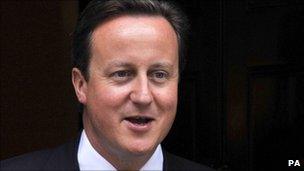9,000 in public sector get more pay than prime minister
- Published

Prime minister David Cameron currently earns £142,500
More than 9,000 public sector employees are earning a higher wage than the prime minister, who has previously questioned pay levels in top jobs.
New research conducted for BBC Panorama found that there were more than 38,000 public employees earning above £100,000 and 1,000 people on more than £200,000.
David Cameron took a 5% pay cut when he took office and earns £142,500.
Details from 2,400 public bodies puts the number of high earners far above previous estimates.
The salary details come as the government warns that public spending needs to be drastically curbed.
The government has already revealed that pay for the top 5% of earners in the public sector has risen by 51% in the past 10 years.
Unison general secretary Dave Prentis described the report as "just another attack on the public sector".
He said: "There will be many more in the private sector who earn much more than this. However, the majority of public sector workers will never get anywhere near these salaries.
"For example, two thirds of local government workers earn less than £21,000-a-year and are facing a three-year pay freeze.
"There should not be such a gap between those at the top and those at the bottom. The pay freeze will only make it worse."
The prime minister and his cabinet took the 5% pay cut when they formed the government at a time of record deficits and a sluggish economy.
In collaboration with the Bureau of Investigative Journalism, Panorama requested pay details from most of the UK's publicly funded organisations, including local authorities, schools, universities, the BBC, the NHS and the government agencies known as quangos.
Across the UK, the NHS has the highest number of high earners, with more than 26,000 people on more than £100,000. Of those, nearly 6,500 earn more than Mr Cameron. The top NHS earner is a GP on at least £475,000 and seven out of the top 10 in the NHS are GPs.
The database, compiled from both public records and freedom of information requests, excludes some major publicly owned corporations, including Royal Mail, Network Rail and Channel 4 because they operate largely as commercial concerns.
The BBC's salaries were included because the BBC is funded by the £145.50 licence fee paid by UK households. There are 331 managers at the BBC earning more than £100,000.
Lucy Adams, the head of BBC People, said the corporation needs to compete with the private sector for top talent in the media and entertainment industries. She said the BBC is dealing with the issue of executive pay.
She added that Director General Mark Thompson - who for the year 2009/10 received a total remuneration of £838,000 including base pay of £668,000 and £7,000 in benefits in addition to a £163,000 pension payment - and other senior managers at the BBC had taken pay cuts: "We have given up, all the executives have given up two months' pay. We have had a pay freeze for the next four years."
'Challenging, rewarding'
At the local council level, the chief executive of Tory-controlled Wandsworth Council in south London, Gerald Jones, is the highest earner on £299,925, leading a list of 362 local council employees earning more than Mr Cameron.
In light of the new research, Francis Maude, the Cabinet Office Minister, called for a return to a more "old-fashioned" public service ethos.
Mr Maude said he questioned the sweeping pay rises in the wider public sector under the former Labour government and the idea that they were necessary to attract qualified people.
"You're sort of blithely told you cannot fill the job unless you paid this amount and actually I think often that's too easy, it's a lazy view and actually getting the right people is much more about exciting them with the sense that it's a challenge, that they will find it rewarding."
Mr Maude's own department has 22 people earning more than the prime minister and the Department of Communities and Local Government, headed by Eric Pickles, has nine.
Some argue that the delivery of top quality public services commands high wages.
Consultant Stephen Taylor, who has advised government agencies and the Cabinet Office, said for positions such as running a large local authority, there were not many people with the qualifications - especially at a time when the job would require implementation of deep cuts - and they commanded high wages.
"I'd want to attract the best people in the country to be interested in doing that job," he said.
Iain Overton, editor at the Bureau of Investigative Journalism, said the database - collated between February and September - was very relevant ahead of anticipated widespread public service job cuts.
"There is a challenge ahead for government - how can you justify the top salaries of the people running the system while making swingeing cuts that are most likely to affect the lowest paid in the public sector?"
Panorama: Because We're Worth It - The Taxpayers' Rich List, BBC One, Monday, 20 September at 2030BST and then available in the UK on the BBC iPlayer.
- Published8 July 2010
- Published6 July 2010